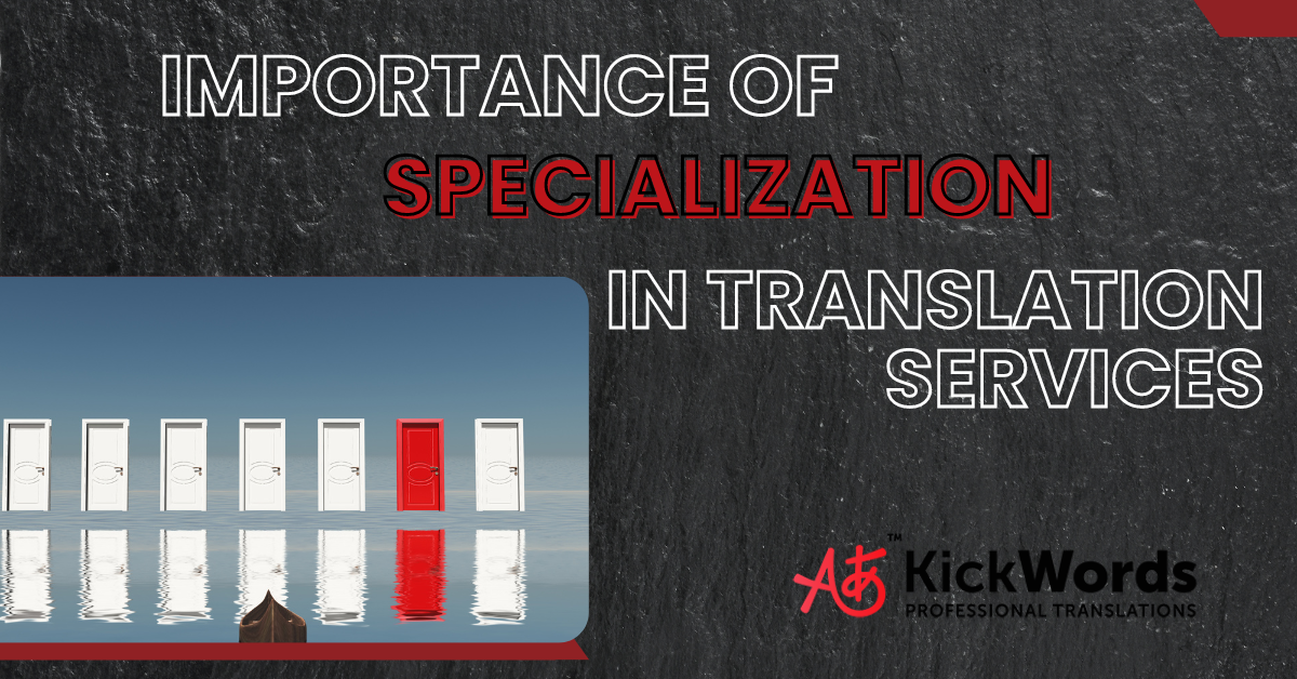Translators specialise in different areas, just like any other profession.
Some of them may be better in medical translation, while others may be more experienced with legal documents. There are many different translation types, each with its challenges.
Moreover, the best translators are also familiar with the target language’s culture, which helps them better understand the text and provide a more accurate service.
When choosing a translator, it is important to consider his/her area of expertise, as well as their experience.
This will ensure that you get a professional and reliable text.
What is a translator’s specialisation, and why is it important?
A specialisation is a focus on a particular area of expertise within a certain industry.
For translators, this means becoming an expert in certain types of translation, such as medical, legal or technical ones.
Translators who specialise in a particular area of expertise are able to provide more accurate and precise texts as they have a deep understanding of the subject matter. As a result, clients who require specialised translation services can be confident that they are receiving high-quality work.
For example, a medical translator needs to be aware of the many different specific terms in both languages and have a good understanding of medical procedures as well.
Otherwise, a simple mistake can lead to serious consequences.
A medical translator also needs to be able to convey the meaning of documents accurately and clearly. This can be a challenge, as many terms have multiple meanings or can be interpreted in different ways.
The translator needs to be able to choose the right words and phrasing to ensure that the document is understood correctly.
Such a deep understanding can only be gained through extensive experience and knowledge in the relevant field, which is impossible for a generalist translator.
What are the different types of translator specialisations, and what do they involve?
All professions have many types of specialisations, and translators are no different.
Some specialise in translating medical documents, others in technical manuals, while still others might focus on legal or business documents.
Most translators specialise in one or two specific areas to become experts in those fields.
This way, they can better understand the text they are working with and produce accurate services.
Some of the most common translator specialisations
-
MEDICAL TRANSLATION
Medical translation involves the translation of medical documents from one language to another.
This can include the translation of medical reports, patient records, case studies, as well as prescription and discharge summaries.
Medical translation is a complex and sensitive task that requires a high level of attention to detail.
-
FINANCIAL TRANSLATION
This type of translation deals with financial reports, statements, and other similar documents.
While a lot of the language in these documents is fairly standard, there are also many specialised terms that must be translated correctly to maintain the original document’s meaning.
Financial translators must have a good understanding of both finance and accounting.
-
LEGAL TRANSLATION
Broadly speaking, legal translation involves translating any document that is related to the law.
This can include everything from contracts and court documents to legal textbooks and articles.
Legal translation is a complex process, as it requires a good understanding of the source text and deep knowledge of the legal system of the target language.
-
TECHNICAL TRANSLATION
Technical translation involves the translation of documents produced by technical writers, such as manuals, user guides and catalogues.
Technical translations are typically very difficult and require a high level of expertise due to the specialised vocabulary and terminology.
In addition, technical writers often use abbreviations and acronyms, which can make the translation process even more challenging.
-
LITERARY TRANSLATION
Literary translation is the process of translating a piece of literature from one language to another.
This can involve translating a novel, short story, play or poem.
The process of literary translation can be quite challenging as it requires not only a deep understanding of both languages involved but also an understanding of the culture and context in which the piece was originally written.
Of course, there are many other translator specialisations like educational, scientific, commercial, etc.
Each type of translation has its own characteristics, so it’s important to know for which purpose a text will be used before choosing the right translator.
How can you choose the right translator specialisation for your needs?
There are many factors to consider when choosing the right translator specialisation for your needs.
All of them are important, but some may be more important than others, depending on what you are translating.
How can you choose the best option? Here are a few tips.
You should consider:
- The type of document you need to translate. Is it a legal or medical document? Maybe a technical manual? The translator you choose should have experience with similar types of documents.
- The subject matter of the document. Does it deal with complex concepts? Jargon? The translator should be familiar with the subject matter and be able to translate accurately without losing any meaning.
- The audience of the document. Who will be reading it? The translator should be able to write in a style that is appropriate for the audience.
- The tone of the document. Is it formal or informal? The translator should be able to maintain the original tone while still conveying the meaning accurately.
Remember: the more specialised your translator is, the better your results will be.
What are the benefits of working with a specialised translator rather than a generalist one?
While some translators may choose to specialise in a particular area, others may prefer to remain generalists.
There are advantages and disadvantages to both approaches.
Specialising in a particular area can allow a translator to become an expert in that field, which can be beneficial when working on a difficult or technical text.
However, it is important to remember that not all fields are equally represented among specialised translators.
Some areas, such as medical or legal translations, require a very specific skill set that can be difficult to obtain without years of experience or formal education in the field.
In addition, certain terminology and jargon can be unique to a particular industry or subject matter, making it essential to work with someone who is familiar with the language used in that area.
Specialised translators also tend to better understand the cultural nuances that can impact the meaning of a text, which can be critical in ensuring an accurate translation.
On the other hand, working with a generalist translator can be beneficial when the text is not overly technical or industry-specific.
Ultimately, the best decision depends on the specific needs of the project.
Moreover, assuming that both the specialised and generalist translators are equally skilled, there are a few key benefits to working with a specialised one.
First, they have likely translated similar texts before, so they will be able to produce a high-quality, accurate translation more quickly.
They will also be better equipped to handle any necessary research to ensure that the final translation is correct.
Finally, because they understand the context and culture of your industry, they can provide valuable insights that a generalist translator might not be able to offer.
Overall, working with a specialised translator has its advantages and can help you get a high-quality translation with less risk of mistranslation.
How can you make sure that you’re hiring the right translator for your project’s specific needs?
There are a few essential things to keep in mind when searching for the right translator:
- First, consider the translator’s credentials and areas of expertise. Ensure they have experience translating the type of text you need, whether it’s technical documents or literary works.
- Second, consider the translator’s language skills. They should be fluent in both the source and target languages and have a strong understanding of the culture and customs of both countries. This will ensure that they can accurately translate the meaning of the text, not just the words.
- Third, take some time to speak with the translators before hiring them. Discuss your project in detail and ask for examples of their previous work. This will give you a better idea of their translating ability and whether they are a good fit for your needs.
- Finally, be clear about your project deadlines and budget from the start to avoid any surprises later on.
By following these tips, you can be confident that you will find the right translator for your project.
And if you’re currently looking for one – we are at your service!
We work with translators representing many different fields and specialisations. Drop us a line to find out more!
Source: Why is a translator's specialisation important? - Aploq Translations


